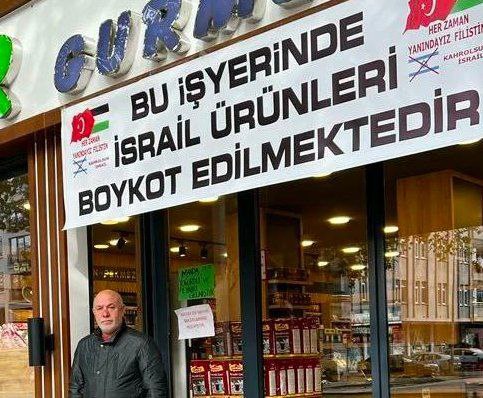Bünyamin Tekin
Turks’ decision to boycott products of Israeli companies or pro-Israeli brands in response to Israeli attacks on the Palestinian enclave of Gaza may hurt the Turkish economy.
That’s according to Turhan Bozkurt, business editor of the Kronos news website and a YouTube influencer with a channel followed by 186,000 people that focuses on economy-related news, speaking to Turkish Minute about Turks boycotting products in response to Israel’s attacks on Gaza.
Israel began pounding Gaza after Hamas militants carried out an unprecedented surprise attack in Israel on Oct. 7 that claimed more than 1,400 lives. The ongoing Israeli attacks on Gaza have so far claimed more than 6,500 lives, according to local health officials.
In times of national outrage against Western governments, Turks have previously made headlines by posting videos of smashing iPhones with bats, hammers and the like, or pouring Coca-Cola into streets or toilets to show their distaste for US goods.
Tamam Görevinizi Yaptınız Allah Hayrınızı Kabul Etsin. Dağılabilirsiniz. En İyisi Bu Boykot İşinden Vaz mı Geçsek?😏
#TikTok #GazzedeKatliamVar #Boykotisrail pic.twitter.com/micOVpr9FH— mehmet ali aygan (@ayganmali) October 25, 2023
When Turkey was at odds with the Netherlands for refusing entry to a Turkish minister who wanted to meet with Turkish voters in the country before a referendum in 2017, some Turks posted videos of themselves stabbing oranges to show their protest against the Dutch, whose royal family is symbolized by the color orange.
Now, after the recent flare-up of the conflict between Israel and Hamas, there are again many images on social media showing lists of brands that posters claim are either Israeli in origin or pro-Israel, calling for a boycott of their products.
In one video making the rounds, a woman can be seen putting a warning sign on some of the products she wants to boycott that reads, “Made with the blood of Palestinians.”
Elimden ne gelir deme… İşgalci israil'e ait ve destek veren firmaları bu şekilde de boykot edebilirsiniz. pic.twitter.com/LeIgHq78Q5
— Ayşe Bağdat 🇹🇷🇵🇸 (@aysebgdt42) October 21, 2023
According to Bozkurt, who stressed that the loss of thousands of civilians is a tragedy and that it’s natural to be outraged by it, a boycott is a civil form of protest for people against injustice. However, there is one caveat he stressed.
For example, if you want to boycott a brand like food giant Danone to protest its political stance, it’s a double-edged sword. If that brand has factories in Turkey and gives jobs to Turks, as is the case with Danone, then that hurts the Turkish economy, Bozkurt points out.
These actions, even if well intentioned, are done arbitrarily by Turks and without considering whether they are shooting themselves in the foot.
Bozkurt claimed that boycotting these products once they reach the supply chain of Turkish markets would only hurt Turkish intermediaries, and as these emotional reactions disappear like a flash in the pan, the harm they cause will be suffered by Turkish retailers rather than the companies that have already sold their products and have their money.
He says the most appropriate response to such situations should be at the level of government as they know better what diplomatic, trade or other tools they can use to influence their counterparts’ decisions.
If there should be a boycott of Israeli companies, the government should ban their entry into the Turkish market, according to Bozkurt.
Turkish President Recep Tayyip Erdoğan, who brands himself as a champion of the Palestinian cause, previously called for a boycott of Israeli products in 2018.
This time, the president had struck a more moderate tone on the first day of the war, condemning all attacks on civilians and calling on Israel to respond in moderation. However, he became much louder after last week’s deadly attack on the Ahli Arab Hospital in Gaza, which led to large and angry protests across the Muslim world.
